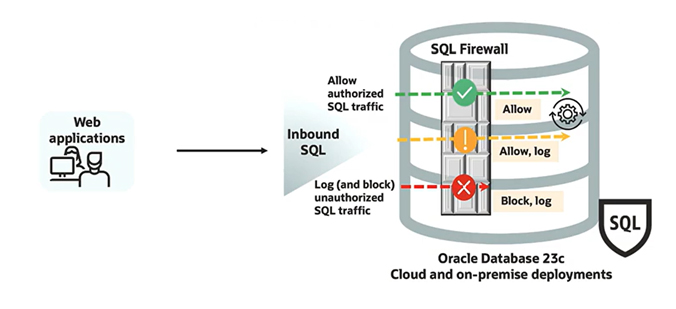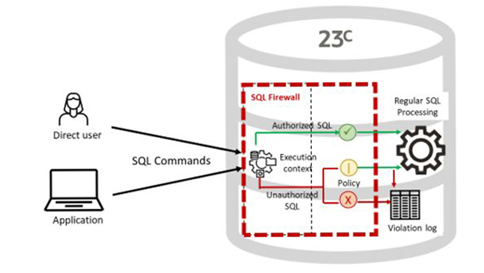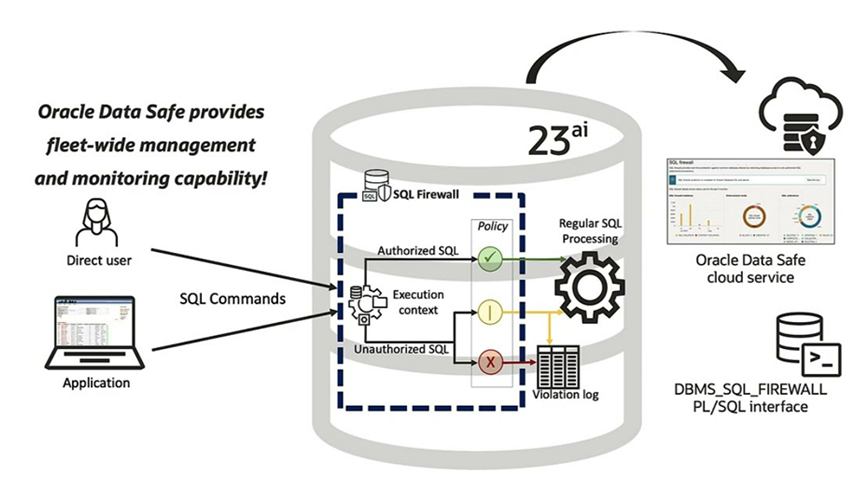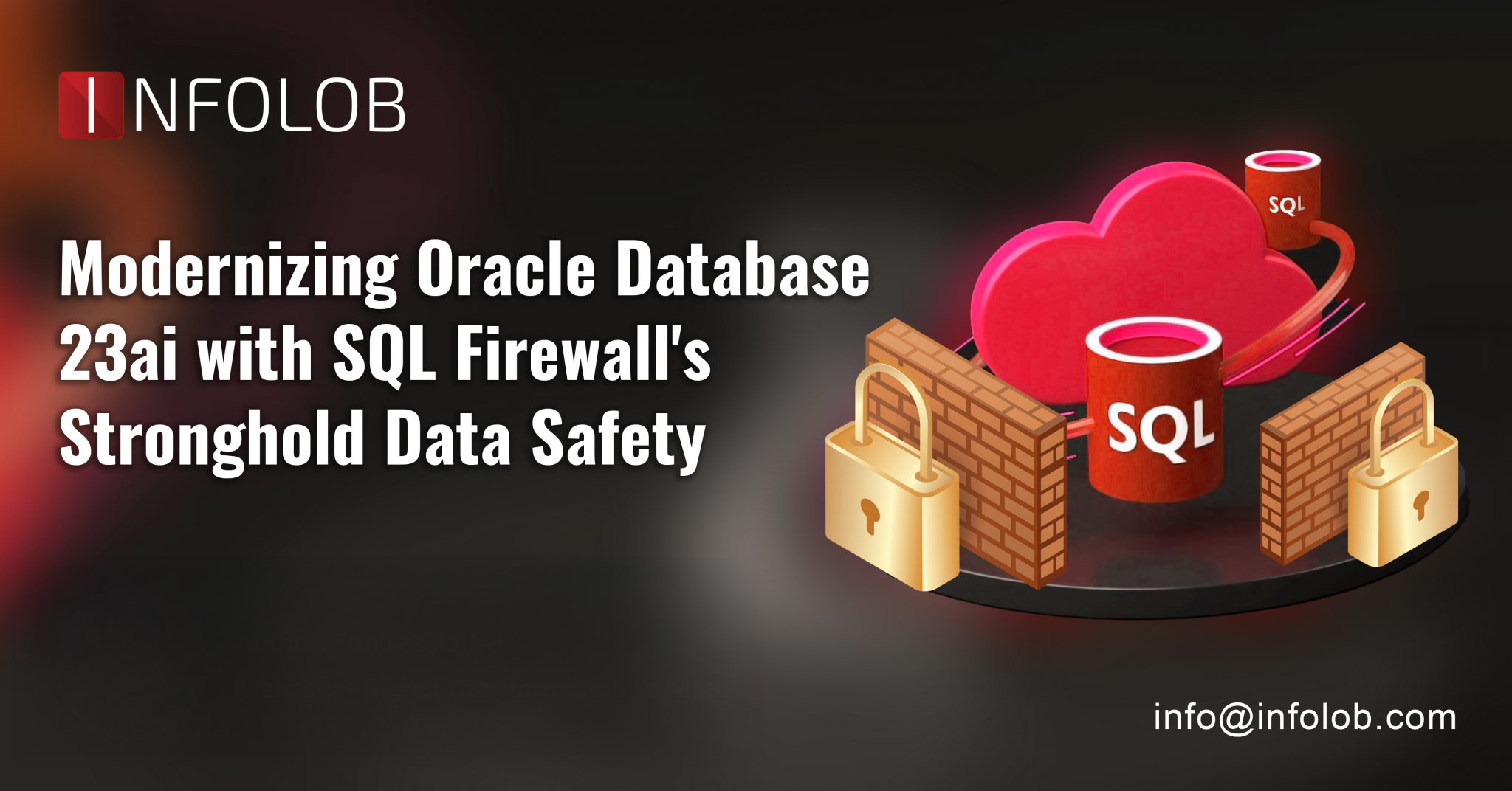Previously, our exploration into Oracle database 23ai has been massively helpful and serves the industry in many ways with its limitless features. Oracle Firewall inside Oracle Database 23ai is another competitive feature that provides high-level security, ensuring data safety. The innovative feature by Oracle shows how the database modernization expands its horizons to scale enterprises as per time-intensive workloads. Know how Oracle SQL Firewall inside database 23ai enhances your database portfolio from our Senior Manager, Srinivas Raikal.
Heads and Tails of Oracle SQL Firewall
Oracle SQL Firewall inspects all incoming database connections and SQL statements to guarantee that only explicitly approved SQL can be executed in the database. SQL Firewall is a component of Oracle Database kernel.
Oracle SQL Firewall offers real-time security against common database attacks by limiting database access to only permitted SQL statements or connections for a specific user.
Oracle Data Safe’s SQL Firewall feature allows you to operate and monitor SQL Firewall for Oracle Database 23c databases. Administrators can use Data Safe to collect SQL activities from database accounts, monitor the collection status, generate SQL Firewall policies with allowlist rules (allowed contexts and SQL statements) based on the collected SQL activities, and enable SQL Firewall policies.
SQL Firewall uses allowlists of approved SQL statements and trusted database connection pathways to identify which SQL statements and connection paths are permitted and which should be logged or prohibited. SQL Firewall allowlist policies operate at the database account level. To construct a SQL Firewall allowlist for a database account, capture or aggregate the expected application SQL workload from expected database connections. Subsequently, the firewall detects and stops unauthorized SQL and SQL injection attempts.


Inside Oracle Database 23ai – SQL Firewall’s Integration
- SQL Firewall scans all incoming database connections and SQL statements, including those from PL/SQL, whether local or over the network, encrypted or plain text. It cannot be bypassed. It only allows SQL that is explicitly approved. For all other SQL, it logs the objectionable statements and reports violations. This statement could have been a SQL injection attack or a fresh SQL statement that the authorized user had not previously executed.
- You can choose whether to prevent unauthorized SQL or simply log it. This allows you greater versatility in dealing with attacks.
- It investigates both the SQL and the processing context. By running inside the Oracle database server, the firewall may easily encode SQL statements, synonyms, dynamically produced object names, and any SQL statements generated dynamically in PL/SQL units.
- It relies on the allow-listing of authorized SQL statements and their trusted database connection pathways to prohibit the remainder. To train the SQL Firewall, just capture approved SQL statements for a database account. Subsequently, the firewall detects and stops unauthorized SQL and SQL injection attempts. Allow-listed SQL statements are commonly used to execute application SQL workloads issued by an application service account.
- SQL Firewall can also prevent connections that do not originate from trusted IP addresses, operating system usernames, or application names. This function is handy when you need to put some protection in place right away, while you develop the allow-list of SQL queries for your apps. This functionality ensures that any direct access to your databases comes only from trustworthy endpoints. This also helps to reduce the possibility of stolen or abused application service account credentials.

Scenarios of SQL Firewall
- Real-time protection is achieved by restricting database access to just permitted SQL statements and database connections.
- Protect against SQL injection attacks, abnormal access, and credential theft.
- Enforce trusted database connection pathways.
SQL Firewall administrators can use Data Safe to collect a database user’s SQL activity and associated database connection pathways (IP address, OS program, OS user), as well as track the collection’s progress. Data Safe allows you to develop and enable SQL Firewall policies based on collected SQL traffic. Data Safe automatically gathers violation logs and allows you to monitor SQL Firewall violations via the console.
INFOLOB leverages Oracle Database 23ai’s SQL Firewall feature to deliver unparalleled database security. By meticulously inspecting all incoming database connections and SQL statements, SQL Firewall ensures that only explicitly approved SQL can be executed. This proactive approach not only thwarts common database attacks but also provides real-time protection against SQL injection, abnormal access, and credential theft.
Through Oracle Data Safe, administrators can seamlessly manage and monitor SQL Firewall policies, enhancing their ability to safeguard critical data. The use of allowlists, capturing expected application SQL workloads, and enforcing trusted database connection pathways collectively fortify the security perimeter. INFOLOB’s commitment to adopting advanced security measures like Oracle SQL Firewall exemplifies our dedication to protecting sensitive information and maintaining the integrity of database operations.
With SQL Firewall’s robust capabilities, businesses can confidently operate in an environment where data security is paramount. However, INFOLOB stands at the forefront of this technological advancement, ensuring their clients’ databases remain secure, compliant, and resilient against ever-evolving threats. This strategic implementation underscores INFOLOB’s role as a leader in delivering cutting-edge database security solutions.
For all queries, please write to:





